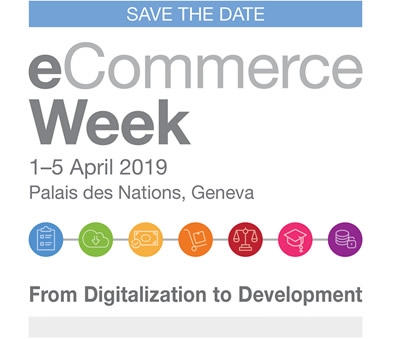E-commerce, technology, and trade promotion: Creating opportunities for all
2 Apr 2019 11:30h - 13:00h
Event report
[Read more session reports and live updates from the UNCTAD E-commerce Week]
The session ‘E-commerce, Technology, and Trade Promotion: Creating Opportunities For All’ took place in Geneva, Switzerland on 2 April 2019. The goal of this conference was to provide insight into how trade promotion organisations (TPOs) can utilise e-commerce effectively.
The moderator, Mr P. Perreault (The Getting to Global Initiative) began the session by informing the audience that since demand has been made by consumers, e-commerce is now unavoidable and growing quickly, and business will need to follow. According to Perreault, 82 percent of consumers in the world have purchased goods online; however, less than 10 percent of SMEs sell internationally online, because the cost of selling internationally is higher. After this short introduction Perreault introduced the first panellist, Mr Adolfo Fernández (Global Program Manager, International Growth Strategy Google). He stated that consumers are becoming more impatient and demanding and most SMEs are not able to keep up with the demand. He has worked on a tool called Market Finder, produced by Google, to help companies ascertain a focus in order to reach the international consumer. To help understand realities in developing countries, the next panellist, Ms Anne Chappaz (Chief, Institutional Strengthening ITC) listed the challenges developing countries face in developing a strong e-commerce strategy; these challenges include lack of necessary skills, lack of the right content rules, lack of ability to handle different currencies, lack of cost-efficient infrastructure, and lack of stable suply of electricity. Perreault interjected at this point to state that a booming economy is to blame for some of these challenges. Since some MSMEs are not aware of the global commerce going on around them, they are fearful of the unknowns in approaching opportunities for growth. Recently, we have seen a change in TPOs working with partnerships that provide services to these smaller businesses. As a result, this can strengthen e-commerce in the developing countries, providing a breakthrough to global commerce, improving cash flow, and creating an international brand. To aid this the ITC is also focussing on a few e-commerce projects with the aim to add the economic empowerment of women.
Mr Clint Reid (CEO of Zonos) discussed an online website that aids SMEs to calculate the duty and tax on various goods. The issues are that many businesses want to reap the benefits of going global; however, a lack of trust between the international customer and the international retailer impedes development. It can be frustrating to the customer when they discover a shipping cost added to a previous payment when the item has reached their country; it is likewise frustrating to an international business if an item is returned or they lose business due to the lack of transparency. Reid suggests that MSMEs can improve by setting expectations. The first step would be to offer a postal solution for customers; although it may be costly, the opportunities will outweigh the risks. Then they should be transparent with shipping costs by using a plugin on their website that will allow the user to understand the cost associated with shipping the item.
To conclude the session, many of the panellists shared the concern that growing technology can cause a digital divide between the developed countries and the developing countries. Thus, providing aid to bridge the gap grows in importance.
By Jainee Feliz-Cabrera
Related topics
Related event

eCommerce Week 2019: From Digitalization to Development
1 Apr 2019 15:45h - 5 Apr 2019 15:45h
Geneva, Switzerland
